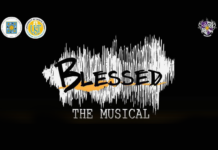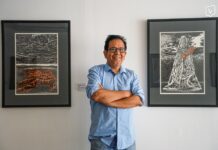My mom once told me that my first awareness of music had dated back more or less four weeks before my expected date of delivery. Mom could not understand why she was gasping for breath when lying flat in bed. She said I was “relentlessly” moving and squirming inside her womb. My eight-year-old sister, who by then already knew how to play the guitar, got her favorite instrument and sat by her side to sing for mom the latter’s favorite piece, in order to console her and lull her to sleep. When my sister was about to sing she accidentally strummed her guitar. Its sound amazingly calmed the baby down inside her womb and pretty soon, she fell asleep.
In my later years, I heard stories that unborn babies indeed possessed the capacity to listen to music. In my particular case however, a CS (caesarian section) delivery by my physician revealed I almost got strangled by my own umbilical cord. But to this day, I keep remembering that the music I heard while still in my mother’s womb must have enabled me to survive, and the incident had been to me, infinitely worth keeping.
After high school, I took an entrance examination for Architecture at UST. I did not see my name among the passers. I went back to San Beda College, my High School Alma Mater, to enroll in an Economics course. After two weeks however, I had to drop my subjects because I felt I could never be an economist. A year afterm I went back to UST and took up a qualifying test for Music. I was delighted to see my name appearing among the top two of the heap. After two months of summer classes in the Conservatory; curiosity drove me back to check my name again at the College of Architecture; to my surprise, my name appeared in the waiting list but I was already enjoying the ambience of the Conservatory.
First four weeks of classes was enormously challenging for me. Along the school’s hallway I was awed by what I heard: angelic voices of students in the classrooms, and rhythmic, almost flawless piano renditions in another room. I was a late bloomer in the keyboards because my peers had piano lessons since pre-school. This left me feeling almost bewildered. But I was not daunted. I kept hoping that someday, I would be able to acquire the rather elusive music degree. In my third year at the Conservatory my dad “devised a curriculum” for me, that is, requiring me to master on the piano at least two standard / jazz songs or all-time favorites in one week. By the end of the tenth week I was playing at the piano with ease. That experience could have given me the courage to venture on my own.
Shortly after I found myself musically directing company or government choirs. I was practically winning against all odds as I realized, I was competing with seasoned and veteran musicians. It was virtually an uphill climb. With an “Awit Award” in 1995, and a composition which won in a competition sponsored by Yamaha Electone National Festival, I felt I had begun to blaze the trail because that composition became the Philippine entry to the Asia-Oceania Yamaha Electone Festival held in Sydney, Australia.
Things happened rather so fast because from 1998 to the present I am the musical director of “Maalaala Mo Kaya”, a multi-awarded ABS-CBN drama anthology. Subsequently, on the side, I musically directed such television soap operas, namely: “Wansapanataym,” “Marina,” “Kampanerang Kuba,” “Pangarap na Bituin,” “Walang Kapalit,” not to mention such youth-oriented shows as “Lovespell” and “Your Song”
Perhaps, the TV music scorings weren’t the result of thechnical training learned in the classroom as, to date, scoring principles aren’t formally pursued in many schools. Much of my skills were rather learned through painstaking self-study. I would occasionally indulge viewing local or foreign films not so much for their videos but for their music — their tonal twists and moods, their bends and turns.
I guess, as in many other professions, the secret still depends much on the individual. I honestly believe in the truism that doing even simple task, can be fulfilling and rewarding if it is something one wants to do and is happy doing it.
I often heard from elders there is no money in music, that music is generally reserved for those who wish to expand their cultural horizons. In this year’s Commencement Exercises to mark the graduation of the 2009 UST Conservatory Students I heard one graduate ask: What awaits us after graduation? Can we land a gainful employment? What can the Music Alumni do for us? To these myriad of questions I don’t have ready answers. My case however seems to have negated that notion.
Perhaps, music education can be fulfilling. Those truly gifted ones can be performing artists or musicians. They can excel in their chosen fields. These are as varied as their major subjects may permit. I wouldn’t, however wish to touch on the other fields which are, as conceived in my theme – mining the hidden gold in a music career. And what are these?
First, Musical Scoring for Film and Television. This is a challenging creative work because governments worldwide are presently bent on solving the problems regarding intellectual property rights. Thus, “canned music” is on the way out. Emphasis is now on original compositions and this is a boon to honest-to goodness musicians! Second, Commissioned Work. Creation of commercial “jingles” for advertising or promo of a particular product, person or idea. This sounds loose-sounding. But this is conceptualizing a tune for the “juiciest” idea to portray their qualities within a particular time frame running either for a few seconds to a minute. Still falling under commissioned work are Development of Theme Songs, Anthems, Company Hymns, fittingly portraying the ideals of an institution – its vision and mission.
Third, Musical Arranging and/or Composing for CD Albums (CD Production), Sage plays (Musicales), Orchestra, band (for Classical/Pop/Jazz concerts), ensembles or choir groups.
Fourth, Music Entrepreneurship. These seems to be a growing impetus to venture on production of concerts or shows. Falling under this is managing performing groups for music lounges or pop/jazz bars or for special events. Fifth, Music Publishing which includes printing and publishing of original musical compositions/pieces developed in English or in the vernacular which, to date, continue to be well-lobed fro their cultural value. Here the publisher or writher could playa a role in the preservation of the nations’s cultural heritage. Sixth, Setting up of a Recording studio for artists is of inestimable value.
Imperceptibly, foregoing discussions lean not so much on music theory and techniques but perhaps on the individual’s over all perception of his role as creative changing demands of the music industry, name ly, choice of musical genre, knowledge of computer music, and a practical knowledge of the over-all thrust in music industry.
When I produced and directed a Jazz Concert at Centerstage SM-Mall of Asia last September 18 and 19, which incidentally was endorsed by Cardinal Gaudencio Rosales, I was so touched by the invocation of Msgr. Celso Datin, spiritual director of the Legion of Mary, Senatus of Northern Philippines. He said: “Music is faith in God made alive.” I strongly believe that: for as the musician feels God’s presence in everything he does, he can never go wrong.













